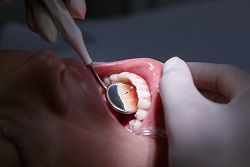Periodontal Disease may Indicate Lupus Severity
Higher lupus disease activity may be associated with bacteria from periodontal disease, which may be an important modifiable mediator of SLE disease activity.
(©Zlikovec,Shutterstock.com)

A new study published in Clinical and Experimental Rheumatology links higher lupus disease activity to bacteria originating from periodontal disease. Bacterial infections are common in patients with systemic lupus erythematosus (SLE), but only recently have pathogens from the mouth been implicated as a prominent source. More importantly, wrote authors Bagavant and colleagues, the presence of specific oral plaque-based bacteria might be an important modifiable mediator of SLE disease activity.
The mucosal surfaces of the mouth and gums are abundantly colonized by a variety of bacteria that may enter the body via the gingival epithelium to challenge the immune system, which the investigators theorized could promote higher disease activity in people who are seriously immune compromised. High rates of periodontal disease among patients with SLE suggested a possible causal link.
Using 303 banked serum samples from the Oklahoma Lupus Cohort, the investigators tested for anti-dsDNA antibodies, a biomarker for SLE, as evidence of exposure to various bacteria.
Specifically, high antibody titres of the bacterium Aggregatibacter actinomycetemcomitans were most closely associated with moderately severe to severe levels of SLE disease activity. A similar pattern was observed with Porphyromonas gingivalis, but this association was not statistically significant.
At the same time, the samples did not show high titres of other kinds of periodontal bacteria associated with SLE, such as Treponema denticola.
The study concluded that A. actinomycetecomitans, which is known to induce citrullination of host proteins leading to cell death, is the primary periodontal bacteria involved in lupus, with the potential to drive increases in systemic autoimmune responses.
According to the authors, this finding suggests that “exposure of the immune system to dental plaque bacteria in SLE patients holds a significant potential to modulate the disease,” with clear implications that careful attention to dental hygiene be promoted as adjunctive treatment for SLE. This finding was supported by a small clinical study showing heightened responses to lupus therapy in patients who had “aggressive” treatment for existing periodontal disease.
REFERENCES
Bagavant H, Dunkleberger ML, Wolska N, et al. Antibodies to periodontogenic bacteria are associated with higher disease activity in lupus patients. Clin Exp Rheumatol 2019 Jan-Feb;37(1):106-111.
Fabbri C, Fuller R, Bonfá E, et al. Periodontitis treatment improves systemic lupus erythematosus response to immunosuppressive therapy. Abstract. Clin Rheumatol 2014 Apr;33(4):505-9. doi: 10.1007/s10067-013-2473-2. https://www.ncbi.nlm.nih.gov/pubmed/24415114